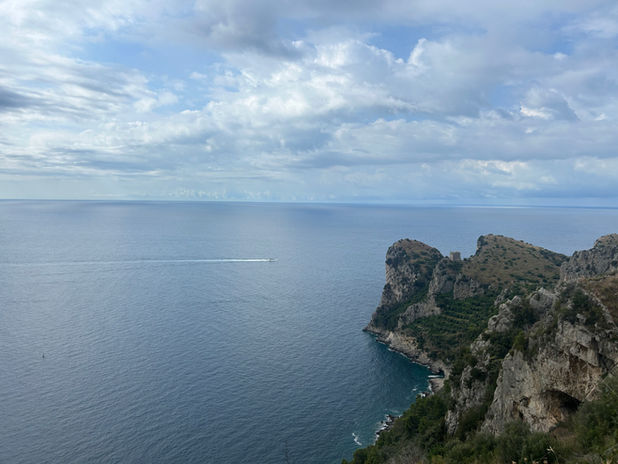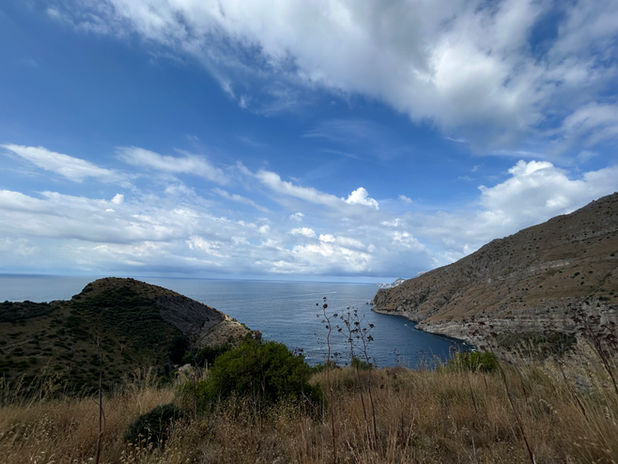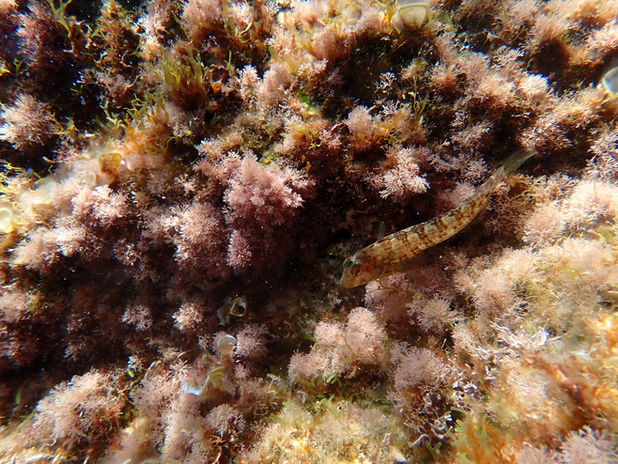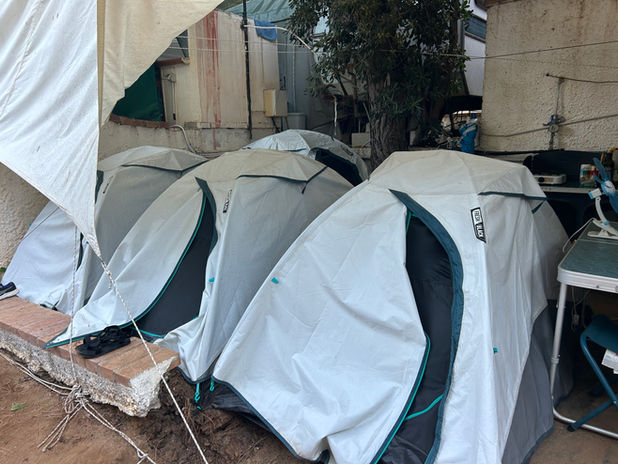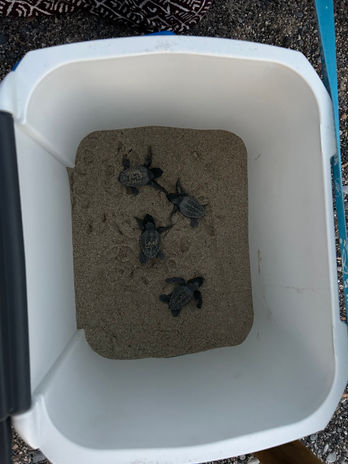
International Internship
Read about my experience working abroad below :)
Position Summary:
- Worked in Ieranto Bay within the Marine Protected Area of Punta Campanella
- Commute consisted of ~40 minute bus ride followed by a difficult ~40 minute hike
- Worked together with 6 other students under the supervision of Domenico Sgambati
- Projects consisted of monitoring fish in the family Blenniidae, collecting litter in the bay, monitoring people and boats in the area, educating the public, and monitoring sea turtle nests and hatchlings
Challenges faced:
- Physical strain from hiking, snorkeling, hauling kayaks, etc.
- Language barrier between myself and many of the park visitors
- Lack of specific directions for tasks
Summary
I worked at the Marine Protected Area of Punta Campanella. In this area, I helped monitor Ieranto Bay as a recovering ecosystem. To do this, I worked with Dr. Domenico Sgambati along with other interns and took a 40-minute bus followed by a 40-minute hike down to Ieranto Bay. Ieranto Bay was historically used as a quarry, which greatly impacted the health of the marine ecosystem. Now that it’s protected, there’s a lot of work needed to continue to increase the environmental health of the bay. I helped do this through several different projects. First, I helped another student with her project measuring biodiversity in the Bay. She was measuring the level of biodiversity using fish in the order Blenniidae. These fish, Blennies, live close to the surface, which makes them good indicators of environmental health because they’re particularly sensitive to environmental changes, especially pollution. By snorkeling and monitoring Blennies, our goal was to measure how well the Bay was recovering. Additionally, I assisted with another project by collecting ocean litter throughout the area. This litter was collected from both the Small Bay and Big Bay areas on the beach, ocean surface, and ocean floor. The trash was then categorized by the material it’s made out of to analyze the most common type of litter in each part of Ieranto Bay. This project led to a better understanding of what kind of trash needs stricter regulations to protect our oceans. In the Bay, I also monitored the number of people and boats. I monitored the people in Ieranto every 2 hours based on what area they were occupying. Simultaneously, I watched for any unauthorized boats that enter the area. Since the area is protected, there's no motor activity, fishing, or anchoring allowed, so when an unauthorized boat enters, I had to sound an alarm and ask them to leave immediately. This whole experience taught me about the specific operations that go into running a marine protected area, and how the process compares with that of America.
.jpeg)
Week 1
Throughout the course of my first week, I've gotten to snorkel to find fish in the taxonomic family of Blenniidae, protect the bay from unauthorized boats, and assist with kayak tours and educational outreach. The training process here is very experiential, and I've learned how to perform necessary tasks by doing them alongside my supervisors. Through this, I've also seen that supervisors give us interns lots of freedom to make our own choices regarding our work so we can learn from our mistakes and grow into our positions. I'm excited for the work that I'm doing preserving the beautiful nature in Italy, and it's evident that everyone within the organization is just as passionate about the progress that's being made. The language barrier has been a challenge, as expected, since many of the bay visitors speak exclusively Italian. Interacting with them has given me practice thinking on my feet and finding other ways to communicate besides just words. I'm excited to see what new tasks and challenges lay ahead.
Week 2
This past week, I’ve been able to take more of an active role in the ongoing projects at Ieranto Bay. I was trained on how to identify and take pictures of Blennies, so I’ve been able to continue learning through interactive methods. Also, I started helping with a project focused on collecting and analyzing litter in the Small and Big Bay of Ieranto. The amount of trash in the Big Bay was way more than I expected for a protected area, and it reminded me of how much work we have left to do in terms of conserving and preserving natural spaces. It was comforting to know that I was at least making a difference, however small. On a happier note, the other interns and I had the privilege of hosting the marine biology students from Sant’Anna one day, so I got to help present the work that’s being done here and share my love for Ieranto with other students who appreciate its beauty. As a whole, I’ve taken more initiative in my tasks now that I’ve gotten more comfortable in my role, and I’ve been able to communicate to some boaters in Italian while monitoring the Bay. This makes me feel even more connected with the local visitors, my Italian colleagues, and the natural Italian landscape I’m surrounded by.
My test results showed a communication style of Analytical, meaning I’m more task-oriented person who asks rather than tells. I feel that I’ve shown this in my internship by being more formal with colleagues and supervisors and taking time to consider decisions before making a choice. When coming across an unexpected obstacle, I feel the need to talk out the different outcomes before committing to one solution. I think this communication style is accurate for me because I’m a more introverted, soft spoken person who likes to hear other peoples’ thoughts and opinions before taking a stance of my own. I show this by not being as assertive as some of my peers and using a softer tone of voice when speaking to others. I would guess that my supervisor has an expressive communication style because he is very direct, which is indicative of a telling style, while also being more sociable and tonal, which points to being people-oriented. Because of the exact opposition between our types of communication styles, I feel that ultimately we work well on a team together.
Through listening in my internship, I’m learning about how locals perceive Ieranto Bay and the conservation mission concerning it. I have to be an active listener to engage with visitors and consider their feedback rather than brushing them off to move on to my next task. I’ve also managed to be open to learning many new things by listening. Since most of my work in the Bay consists of helping with several specific projects, I had to initially absorb a lot of information regarding these projects and their methods. This got me in the habit of being an active listener for all of the following tasks and challenges that have come my way. As an active listener, I naturally request clarification and are attuned to feelings displayed by the other person. I’m a very empathetic person, so listening and responding to feelings comes easily to me. However, asking probing questions and summarizing are not skills I use as often because I often focus on certain details of what I’m being rather than keeping the bigger picture in mind. This is something that I can work on in the coming weeks.
.jpeg)
.jpeg)
Week 3
This week, instead of going to Ieranto Bay, I attended a research seminar focused on ocean litter research and I visited the Portici turtle research center and Napoli Acquariam. These field trips taught me a lot about the current issues facing our marine environments and how the strategies we use at the Punta Campanella marine protected area are working to resolve these issues. I also got to form a more in depth understanding of Caretta caretta, or loggerhead sea turtles, which I’ll be monitoring at the end of July. This information will also be applicable for any marine internships or volunteering I do back in Florida, as loggerhead sea turtles are one of the most common species there as well.
My cross-cultural internship has taught me a lot and made my experience in Sorrento much more immersive. One strategy that helped me interact with people from another culture is getting lots of clarification regarding tasks. With English being the second language of my supervisors, some directions can be confusing at first, but asking questions and seeking clarification has helped a lot in being able to fulfill my obligations as an intern. I also learned how to adapt. One change that was really hard for me to adapt to was the blunt feedback style Italians have. In America, criticism is wrapped in a “complement sandwich” to make it easier for people to accept without negatively affected their feelings or damaging professional relationships. This is very different from the culture of Italy, where people value honesty and direct feedback. Once I understood that this is how people here speak and they’re still satisfied with my work, I was able to become more comfortable with this feedback style. From guest speakers, I’ve gained a greater perspective on global issues. One social issue that I learned more about it LGBTQ+ rights in Italy. I was not aware of how close-minded the government regarding pride and rights for queer people, including equal marriage, adoption, and surrogacy. This was especially shocking to me since Italy has a rich Greek and Roman history with strong gay representation. This realization made me appreciate more how progressive America is on some issues, even though it’s not perfect in this aspect by any means. Now, I’m more determined to keep educated on the state of human rights in different countries around the globe instead of being so solely focused on American politics.


Week 4
I have developed so many valuable skills throughout the duration of this internship. There are three in particular that I feel have strengthened by a large amount and will be useful for the rest of my career. The first of these skills is tolerance for ambiguity. The last weekend of my internship, I went to camp in Palinuro to help the organization Caretta InVista with sea turtle monitoring. The boss of this organization would often tell us the premise of what we needed to accomplish and leave us to figure out the specifics. This is a different structure than I’m used to, as in America I’m often given very specific instructions for every part of a task or assignment. In this case, I was going to spend the night at a turtle nest in Marina di Camerota, so I had to figure out how to get there using public transportation by myself. This was very daunting to me, especially since not many people in this town spoke any English. I was provided with the bus chart times, so I chose which time would get me there before nightfall, and I took all my camping gear with me. I had difficulty finding the bus stop, since google maps didn’t show its exact location. Because of this, I had to converse with multiple people with the limited Italian I know, and I was able to find the correct bus stop. After I arrived at the nest, I waited on the beach for a few hours before others showed up because no one knew when the others would arrive. This whole experience taught me how to cope with little instruction and think on my feet, which will make me more independent and confident in my abilities in future positions.
The second skill is adaptability, which I was hoping to develop during my time here. While working in Ieranto Bay, there were times when plans for the day would be completely altered after we arrived. For instance, there was one time when I arrived to work on the Blenny project but another student was in need of help cleaning up litter for his project. We decided to help clean up litter and to change the plan for the Blenny project to complete that work another day. There was another time when we went snorkeling to find Blennies, but the water was so rough that we had to fight the current to get out. With this kind of work, it’s very important that you’re able to adapt to unexpected outdoor conditions, and these experiences taught me how to be more flexible to these conditions.
Lastly, I have been able to become a very quick learner through this work. On one of our first days, we were given many instructions on how to set up the info point, how to read the people and boat monitoring sheets, which are all in Italian, and how to use the equipment for Blenny monitoring. All these instructions required me to think very proactively about the next task while still completing the current one. Now, from all of these situations, I’m aware of how much I can handle and how much I’m capable of, which makes this experience extremely valuable to me.
Reflection
Throughout the entire course of this internship, I have been pushed outside my comfort zone and have learned a lot overall. I've been challenged by communicating the mission of conservation of Ieranto Bay despite a language barrier, which makes me confident that I can do this with other areas in America. In addition to this, I became aware of the manpower that goes into protecting an area that is not widely known as a restricted zone by locals. One of the main challenges was constantly encountering boaters who were seemingly unaware of the area and its importance. Even though it was positive to be able to educate someone on the area, it was sometimes disheartening how many people showed so little awareness and consideration for the marine environment that they enjoy everyday. I also faced challenges in communication at times with my supervisors because the language barrier made instructions unclear at times. I faced this by asking for lots of clarification and increasing my communication skills from what I would have exhibited in America. Ultimately, I've become proficient in my goals of effectively communicating conservation efforts with the public and observing how a marine protected area can most efficiently run. I can use this information throughout my life and career, making this experience infinitely valuable.
Looking Towards the Future
This internship position has given me
- A better understanding on community outreach and environmental education
- A more global perspective on conservation
- More independence and confidence in my work

Project Management Plan
Approach: Collecting data on fish in the family of Blenniidae and measuring their abundance in Ieranto Bay as an indicator of ecosystem health. Take pictures of Blennies observed and analyze the data.
Stakeholders: Domenico Sgambati, Me
Anticipated Challenges: Unpredictable ocean conditions, Difficulty locating small fish
Desired Results: Evidence of a large population of Blennies that shows recovery in the bay ecosystems as a conservation success story
Smart Goals
Below are the goals I worked to accomplish throughout the internship.

Exhibit thorough understanding of how a marine conservation area is maintained
By working at the marine protected area of Ieranto Bay, I worked to better understand the daily operations behind keeping the area protected from harmful human activities. I learned more about this topic by helping monitor people and boat activity, which I can compare to preserved natural areas in America.

Learn how to effectively educate on the importance of a healthy marine environment
Prior to this internship, I hadn't done much environmental outreach, so I was eager to learn what information people respond to when learning about the Bay and its natural inhabitants. I achieved this goal by working the Infopoint desk, but I also experienced challenges with the language barrier between many of the visitors.

Study the various operations behind monitoring sea turtle hatchlings
Since I participated in sea turtle nest monitoring at the end of the program, I was able to observe the different facets of this study. I was also able to participate in the active protection and data collection of the nests. There were many challenges associated with camping on the beach for 4 days in a tent, but the work was worth it.
More Skills Developed
01
Tolerance for Ambiguity
In my experience working in America, instructions for tasks are laid out in a very clear and detailed fashion, but during this internship, I've been given many open-ended instructions.
02
Problem-Solving
When working in the field, factors such as weather and animal behaviors can be unpredictable. This has led me to become more adept at critically analyzing a situation to decide on the best path forward for both me and the rest of the team.
03
Learning Quickly
Since 5 weeks is not a long time to work somewhere, I had to learn how to efficiently complete tasks as quickly as possible. This was largely developed from receiving many different instructions on my first day and having a short time period to adjust to this new role.
